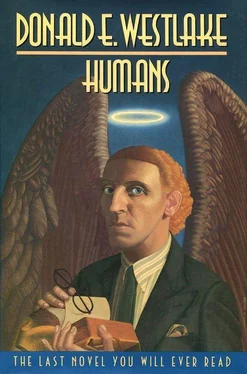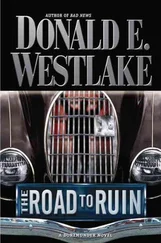The doorman knew it also. Proud inside his overly ornate uniform, like a comic opera admiral, he moved just enough to block Grigor’s path, saying “What can I do for you?”
“You can go back to your fleet,” Grigor told him, reasonably sure the doorman would have no idea what he was talking about, and then, before the process of hurrying him along could begin, he produced the invitation. “You can direct me,” he said smoothly, “to the International Room.”
The doorman didn’t like having to change his evaluation. “You’re late,” he said grumpily.
“It’s still going on,” Grigor said, with assurance. The invitation had specified “five until eight,” and it was now just after seven. It was only at the last possible minute that Grigor had decided he might come to the damn thing after all, reserving the right to change his mind at any step along the way, and it wasn’t until this snobbish doorman had looked down his Slavic nose as though at a peasant or worse that Grigor had finally decided he definitely would attend the soiree (“cocktail party”), that he did indeed belong here.
Was he not, after all, the power behind a television throne? Was he not the author of half the words to come out of Boris Boris’s mouth? Wasn’t he the next best thing to a celebrity; which is to say, a celebrity’s ventriloquist? Be off with you, my man, Grigor thought, I have Romanov blood in my veins. (Hardly.)
Conviction is all. The doorman saw the cold look in Grigor’s deep-set eyes, the firmness of his fleshless jaw, the set of his narrow shoulders, and recognized the prince within the pauper. Returning the invitation, gesturing with a (small) flourish, “Straight through the lobby,” he said, “and second on the right.”
“Thank you.” And Grigor was amused to notice the doorman’s heels come together — silently, it’s true, but nevertheless — as he passed the man and went on into the plush-and-marble lobby.
Sound billowed from the International Room like pungent steam from a country inn’s kitchen. Cocktail party chitchat is the same the world over, bright and encompassing, creating its own environment, separating the world into participants and non-invitees. Cheered suddenly at the idea of being among the blessed this time around, Grigor moved forward into that cloud of noise, which for him was not rejecting but welcoming, and was barely aware of the person at the door who took his invitation and ushered him through the wide archway into a large, high-ceilinged room that had been deliberately restored to remind people as much as possible of the pomp and privilege of the tsars. Gold and white were everywhere, with pouter pigeons of color in the Empire chairs discreetly placed against the walls. Two chandeliers signaled to one another across the room, above the heads of the partygoers in their drab mufti; not a red uniform in the place. It was as though, Grigor thought, the nobles had permitted the villagers one annual event of their own in the chateau’s grand ballroom.
Was there a joke in that? Well, there was, of course, but was it usable? Now that the proletariat had been shown to have made a mess of things, there was a great embarrassed ambivalence about the aristocratic baby that had been thrown out with 1917’s bathwater. Both Grigor and Boris Boris had been trying for months to fit references to the tsars and their families and their world into the stand-up routines, but everything they’d come up with was too flat, too wishy-washy.
The trouble was, they had no clear attitude to express. Surely no one wanted to go back to rule by a class of people who sincerely believed that peasants and cattle were at parity, and yet... And yet, there was something about the style. Not the substance, the style.
The tsars are still in our throats. We can’t swallow them, and we can’t spit them out.
That isn’t funny. That’s merely true.
Looking around for the bar — he was permitted to drink, but not to excess, not yet, that would come later — his eye passed over a pretty girl in the middle of the crowded room, talking in an animated fashion with a tall, burly, thick-faced man who could be nothing but some sort of policeman, perhaps even KGB. The girl was tall and slender, with darkish blond hair and bright eyes and a beautiful nose and great self-assurance. Her clothing seemed to have been made specifically and precisely for her. An American, Grigor thought, and moved toward the vodka.
The Russian with whom Susan Carrigan was speaking was highly amused that she was here in Moscow because she’d won a contest in a magazine. His name was Mikhail, and he was a teacher of economics at Moscow University, a tall, thin, urbane man with a narrow and pleasantly craggy face and a burry baritone voice with which he spoke perfect English, faintly Oxford-accented. “The idea of value in a capitalist society,” he said, “is something my generation will perhaps never understand. A company ferments potatoes into vodka. In order to sell that vodka, they choose at random one citizen — you, as it happens — to send on an expense-paid trip to Moscow. You yourself, with the best will in the world, not to mention the strongest liver, would never be able to drink enough vodka to repay the distiller’s expenses in this venture, and in fact,” he said, laughing, pointing at the glass in her hand, “you don’t even drink vodka. You drink white wine.”
“Yes,” she agreed. “I know it seems silly, but—”
“Not at all, not at all.” Mikhail’s amusement with her was so unfeigned and so friendly that she couldn’t possibly object. “It’s very refreshing to be in the company of a white-wine drinker,” he assured her. “Besides which, you will undoubtedly be the last person on your feet in this room. But to return to the question. The distiller can’t get his money back from you . Is he assuming that other citizens, viewing his generosity toward you, will be encouraged to feel warmly toward him and buy his product in sufficient quantities — in sufficient extra quantities, beyond what they would already buy — to make up his expenses?”
“I have no idea,” Susan admitted. “Whatever they think they’re getting, I’m having a wonderful time. Russia is so beautiful .”
“You think so?” he said, smiling at her enthusiasm.
“The museums,” she said. “The paintings, the icons. And the river is beautiful, you know. I hope the Semionov company does get their money back, twice.”
“Oh, they already have,” said an American-accented voice to her left. She and Mikhail both turned, and a middle-aged fortyish bearded man was standing there in rumpled sports jacket and white shirt and maroon bow tie, smiling his apology at having horned in on their conversation. “Forgive me,” he said, “but I overheard you, and I knew you were — it’s Susan Carrigan, isn’t it?”
“That’s right.”
“Jack Fielding,” he announced himself. “I’m with the embassy here. We processed some of the paperwork on you. Now, the way I think it works — I’m not an economist, I—” Turning to Mikhail, he said, “I take it you are.”
“Yes, I am.” Mikhail introduced himself again, with the impossibly long last name, and the two men shook hands. Then Mikhail said, “You understand the value process of this gift to Miss Carrigan?”
“I think so,” Jack Fielding said. “The principal idea is advertising and publicity. If you offer a prize that a lot of people want, then people will be thinking about your brand name, so when they visit their neighborhood liquor shop they’re more likely to buy your product. So if the plan worked, the company saw a rise in sales while the contest was on, meaning they already made their money out of it before they had to spend any on Miss Carrigan.”
Читать дальше






